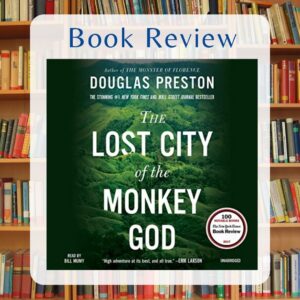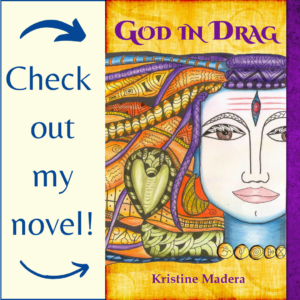
The Lost City of the Monkey God by Douglas Preston
Book Review by Kristine Madera
 I found this while looking for the latest book by Richard Preston, whose true epidemiological tales read like thriller fiction. In a similar vein, Douglas Preston is a novelist, journalist, and adventurer who immerses himself into a quest and then brings it alive on the page so readers can armchair adventure in comfort.
I found this while looking for the latest book by Richard Preston, whose true epidemiological tales read like thriller fiction. In a similar vein, Douglas Preston is a novelist, journalist, and adventurer who immerses himself into a quest and then brings it alive on the page so readers can armchair adventure in comfort.
The Lost City of the Monkey God is a true adventure as gripping as fiction. In it, Preston recounts a 2015 expedition into the remote Mosquitia mountains of Honduras to find the legendary Ciudad Blanca—the White City, also known as the City of the Monkey God. In indigenous and local stories, Ciudad Blanca is the magnificent city where ancestors fled to escape Spanish invaders, and is now long-buried under tropical overgrowth.
The city’s archeological location is in some of the densest jungles and steepest mountains in the world, and nearly impossible to see on the ground, even when you are standing in front of it. It was pinpointed by air in 2012 using lidar (light detection and ranging) technology—a technology that may reveal many more hidden archeological treasures from our distant past.
Preston details the perilous expeditions to the site, including his heart-stopping encounter with one of the deadliest snakes on earth, about the aggressive parasitic mucocutaneous leishmaniasis that Preston and many on the team contracted, and how/why the expedition was vilified by the archeological establishment.
Preston also addresses the age-old problems of uncovering ancient ruins—the fight about who owns them, and how to protect them from looters and others who are willing to pillage human history to cash in on the lucrative antiquities market.
One of the main points I came away with is that the lidar radar used to find this site is available to anyone who can afford to rent the technology. With the market for looted antiquities so high, how do we as a world community invest in protecting all ancient sites as part of our collective human history rather than leaving that task to governments that may not have the resources to safeguard these treasures and risk losing our history to the highest bidder?
A gripping read!
Imagineering Protopia
It’s easy to fall into the idea that history is a settled, provable question and that what we were taught in school is incontrovertibly true. I remember sitting in world history class in high school and listening to the teacher talk about how the Egyptians built the pyramids using logs, ropes, and pulleys. I thought, “do they really believe this BS, and if so what else are they teaching me that they are deluded about?” Then a more suspicious part of me piped in, thinking, “If they know this is hogwash, then what else are they lying about, and why?”
I’ve always been interested in history, especially ancient and/or pre-modern history, so I perk up when I hear about new finds, like the lost city in Preston’s book. Each new find reshuffles our understanding of the past and upends the limited, linear narrative we learned about in textbooks. Since the 1990s some astonishing finds have come to light that deepen the mystery of our human story and the story of Earth.
With Lidar Radar and other modern tools, we will no doubt find more clues to our ancient past that will change the way understand our species and life on Earth. The questions then are: Are we open to adjusting our current perceptions in the face of new evidence? What narratives and research are trustworthy to consider? How can this understanding open us to a more thoughtful path forward?
When I imagine a protopian world, I see a humanity that is curious about both the past and the future and not clinging to narratives–whether national, religious, ideological, family or even personal–as hard facts. Curiosity keeps us open to possibility and allows us to more easily adjust our assumptions based on expanding evidence. New evidence is mounting that our past may be much older and more interesting than we learned in school. Being open to the idea that flush toilets and airplanes don’t make our era the pinnacle of a linear caveman-to-modern human story can help us find common ground and forge a more thoughtful future.

About Kristine
Kristine Madera is a #1 bestselling Amazon author, novelist, hypnotherapist, and pro-topian with a passion for helping people better themselves and the world. Informed by global travel, teaching abroad, and a stint as a Peace Corps Volunteer, Kristine believes that everyone plays a part in imagining and creating our collective future.
Volunteering at Mother Teresa’s Home for the Dying in Calcutta inspired her novel, God in Drag. She birthed her upcoming novel, The Snakeman’s Wife, as a Peace Corps Volunteer in Papua New Guinea.
Read the first chapter of God in Drag HERE
